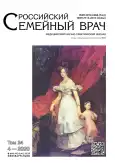Том 24, № 4 (2020)
- Год: 2020
- Выпуск опубликован: 31.12.2020
- Статей: 7
- URL: https://journals.eco-vector.com/RFD/issue/view/3308
- DOI: https://doi.org/10.17816/RFD.20204
Оригинальное исследование
Особенности клинического течения новой коронавирусной инфекции у студентов, находившихся под наблюдением в обсерваторе
Аннотация
Эпидемия новой коронавирусной инфекции (COVID-19) получила статус чрезвычайной ситуации международного значения и привлекла внимание не только специалистов здравоохранения, но и населения всего мира. Несмотря на то что риск тяжелых последствий для здоровья от COVID-19 у молодых людей без сопутствующих заболеваний относительно низок, распространение инфекции в данной возрастной группе может привести к увеличению заболеваемости среди людей более старших возрастных групп, находящихся с ними в тесном контакте и входящих в группу высокого риска смертности от COVID-19.
Цель исследования — оценить особенности клинического течения новой коронавирусной инфекции среди студентов СЗГМУ им. И.И. Мечникова, помещенных под наблюдение в обсерватор.
Материалы и методы. Исследование проведено на базе обсерватора СЗГМУ им. И.И. Мечникова, куда были помещены обучавшиеся, которые контактировали с заболевшими новой коронавирусной инфекцией, с легкими ее проявлениями, а также с клиническими проявлениями острого респираторного заболевания. У всех лиц, переведенных в обсерватор в период с 21.04.2020 по 31.08.2020, были зафиксированы эпидемиологические и клинико-анамнестические данные. В рамках проспективного исследования спустя 3 мес. после пребывания в обсерваторе всем участникам по телефону было предложено заполнить «Опросник по здоровью» (EQ-5D).
Результаты. В исследовании приняли участие 113 человек: 45,1 % мужчин (n = 51) и 54,9 % женщин (n = 62). Средний возраст респондентов составил 22,4 ± 2,5 года. При проведении многофакторного анализа было установлено, что пол, возраст, принадлежность к этнолингвистической группе, хронические заболевания не являются достоверными факторами, ассоциированными с развитием COVID-19. Согласно результатам проспективного исследования статистически значимая разница между ответами респондентов, переболевших и не переболевших COVID-19, была получена при ответе на вопрос о сохранении ощущения дискомфорта или боли спустя 3 мес. от острого периода заболевания (p < 0,05).
 5-12
5-12


Отношение студентов, ординаторов и врачей общей практики к вакцинации
Аннотация
На кафедре семейной медицины СЗГМУ им. И.И. Мечникова было проведено исследование, цель которого состояла в изучении отношения к вакцинации врачей общей практики, ординаторов и студентов.
Материалы и методы. В исследовании участвовали 22 студента, 14 ординаторов и 21 врач общей практики, которые заполняли опросник, включающий вопросы о самооценке уровня знаний в области вакцинопрофилактики, отношении к вакцинации, мнении о ее эффективности и т. д. Статистический анализ данных проводили при помощи программ SPSS 20.0 (SPSS Inc., Chicago, IL, США) и MedCalc 11.5.00 (Medcalc Software, Oostende). Для оценки межгрупповых различий применяли критерий Хи-квадрат.
Результаты и обсуждение. Собственный уровень знаний в области вакцинопрофилактики 61 % участников оценили как хороший, 21 % — как удовлетворительный и 5 % — как отличный. Наиболее уверенными в своем уровне знаний были студенты, на втором месте — ординаторы и на третьем месте — врачи (p < 0,05). Отношение к вакцинации 90 % респондентов определили как положительное. 95,5 % студентов, 85,7 % ординаторов и 76,2 % врачей отметили, что вакцинация необходима (обязательна). Эффективность вакцинации 86 % участников считают высокой. На вопрос, делают ли респонденты профилактические прививки себе и своим детям, большинство выбрали варианты «да, в рамках национального календаря плюс дополнительные» и «все в рамках национального календаря» (51 и 39 % соответственно).
Заключение. Отношение опрошенных врачей, ординаторов и студентов к вакцинации преимущественно положительное, эффективность вакцинации большинство респондентов оценивают как высокую. Большинство опрошенных прививается в соответствии с национальным календарем прививок, значительная доля опрошенных также делает прививки, не входящие в национальный календарь. Практически все респонденты рекомендуют профилактические прививки пациентам.
 13-17
13-17


Мнение студентов медицинского вуза о методах контрацепции и предупреждении нежелательной беременности
Аннотация
В статье проанализировано мнение молодых женщин, студенток 6-го курса медицинского вуза, о применении способов контрацепции для предупреждения нежелательной беременности.
На базе ФГБОУ ВО «Северо-Западный государственный университет имени И.И. Мечникова» Минздрава России проведен анонимный опрос: респонденты заполняли специально составленные анкеты, включающие 29 вопросов, и подписывали информированное согласие для использования результатов анкетирования в научном исследовании. В исследование включено 300 анкет студенток 6-го курса в возрасте от 22 до 33 лет.
Представлены данные опроса о наиболее часто применяемых студентками 6-го курса методах контрацепции, цели использования определенных современных видов контрацепции, уровень осведомленности студенток о выбираемых ими способах контрацепции.
 19-24
19-24


Теория и практика
Эвристики, язык и медицинские ошибки
Аннотация
Эвристики (ярлыки для принятия решений), когнитивные «правила большого пальца», или «короткие пути», используют в клинической практике для принятия решений по тактике ведения пациента как в диагностическом процессе, так и при выборе терапии. Этот метод уменьшает когнитивное бремя процесса принятия решений и часто позволяет получить правильный ответ, но при этом его выбор чреват и врачебными ошибками. В данной статье на примере клинических случаев, в том числе тех, которые закончились неблагоприятным исходом для пациента, рассмотрено, чем грозит такой подход к принятию решений в медицинской практике, Кроме того, в статье проанализированы ситуации, при которых причиной диагностической ошибки могло стать неправильное использование медицинских терминов.
 25-30
25-30


Новости
Итоги конференции с международным участием «Респираторные заболевания в общей врачебной практике»
Аннотация
В статье изложена информация о конференции с международным участием «Респираторные заболевания в общей врачебной практике», которая проходила в онлайн-формате на платформе webinar.ru 14 октября 2020 г. Представлены основные положения докладов, включенных в программу данного мероприятия.
 31-38
31-38


Школа «ВИЧ-инфекция для будущих врачей различных специальностей» (Vera HIV med school): ее ценность и важность для молодого врача
Аннотация
В статье представлен краткий обзор материалов, полученных автором в сентябре 2020 г. при учебе в школе «ВИЧ-инфекция для будущих врачей различных специальностей» (Москва) в качестве ординатора кафедры семейной медицины СЗГМУ им. И.И. Мечникова. Целью школы является повышение уровня осведомленности будущих врачей по теме ВИЧ-инфекции и снижение уровня дискриминации в отношении людей, живущих с ВИЧ, в сфере здравоохранения.
 39-44
39-44


Некролог
 45-45
45-45











